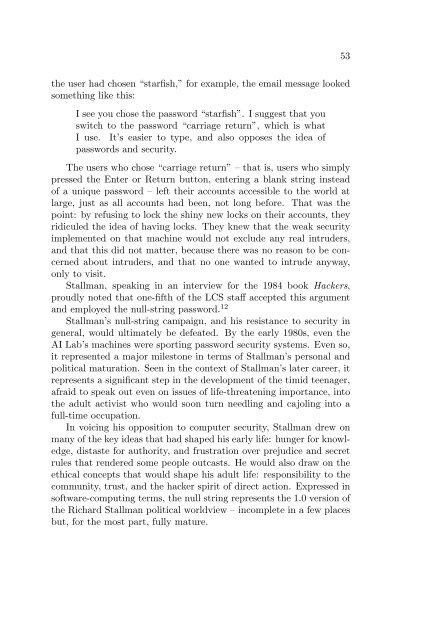You also want an ePaper? Increase the reach of your titles
YUMPU automatically turns print PDFs into web optimized ePapers that Google loves.
the user had chosen “starfish,” for example, the email message looked<br />
something like this:<br />
I see you chose the password “starfish”. I suggest that you<br />
switch to the password “carriage return”, which is what<br />
I use. It’s easier to type, and also opposes the idea of<br />
passwords and security.<br />
The users who chose “carriage return” – that is, users who simply<br />
pressed the Enter or Return button, entering a blank string instead<br />
of a unique password – left their accounts accessible to the world at<br />
large, just as all accounts had been, not long before. That was the<br />
point: by refusing to lock the shiny new locks on their accounts, they<br />
ridiculed the idea of having locks. They knew that the weak security<br />
implemented on that machine would not exclude any real intruders,<br />
and that this did not matter, because there was no reason to be concerned<br />
about intruders, and that no one wanted to intrude anyway,<br />
only to visit.<br />
Stallman, speaking in an interview for the 1984 book Hackers,<br />
proudly noted that one-fifth of the LCS staff accepted this argument<br />
and employed the null-string password. 12<br />
Stallman’s null-string campaign, and his resistance to security in<br />
general, would ultimately be defeated. By the early 1980s, even the<br />
AI Lab’s machines were sporting password security systems. Even so,<br />
it represented a major milestone in terms of Stallman’s personal and<br />
political maturation. Seen in the context of Stallman’s later career, it<br />
represents a significant step in the development of the timid teenager,<br />
afraid to speak out even on issues of life-threatening importance, into<br />
the adult activist who would soon turn needling and cajoling into a<br />
full-time occupation.<br />
In voicing his opposition to computer security, Stallman drew on<br />
many of the key ideas that had shaped his early life: hunger for knowledge,<br />
distaste for authority, and frustration over prejudice and secret<br />
rules that rendered some people outcasts. He would also draw on the<br />
ethical concepts that would shape his adult life: responsibility to the<br />
community, trust, and the hacker spirit of direct action. Expressed in<br />
software-computing terms, the null string represents the 1.0 version of<br />
the Richard Stallman political worldview – incomplete in a few places<br />
but, for the most part, fully mature.<br />
53


